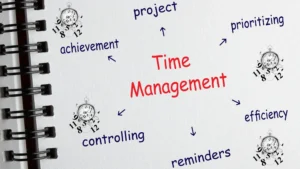Not knowing how to manage time as a freelance writer will cost you more than a few deadlines. It affects your creativity, productivity, and overall well-being.
Writing involves juggling several tasks, so you’ll need a clear system to achieve your goals. Writers who struggle with time management often end up resenting their jobs and missing opportunities.
This generally means that without proper time management, it will be challenging to find satisfaction, as time is highly valuable in the freelance world. Therefore, if writing without losing the clock is your goal, you’ll value the hacks, tools, and strategies in this guide.
Without further ado, let’s make time work for you.

How should I plan my daily routine as a remote freelance writer?
Planning is essential for any writer with goals. To figure out how to manage time as a freelance writer smartly, you must start with a routine.
The goal isn’t to make space for just writing. It’s about building a concrete schedule that matches your energy, not another writer’s, and still allows for deep work, client time, and rest.
A stable freelancing career is impossible without the whole writing package. That is, research, draft, edit, and deliver. So, don’t omit any part from your routine because all activities matter equally.
How do I structure my daily routine?
Start with weekly planning: Map out time to develop a weekly routine. Outline every important detail, including ongoing projects and their deadlines. This plan becomes the foundation for your daily routine.
Let me break it further down. If one of your weekly milestones is to complete three articles, break this down into daily tasks: Spend the first day gathering research, the second day writing drafts, and the third day reviewing and editing.
You will notice that the big goal has become manageable and actionable. Assuming you are a fast writer, you can fill your day with writing activities without getting overwhelmed.
For example:
9:00 a.m. – 12:00 p.m. for research
1:00 p.m. – 3:00 p.m. for writing
4:00 p.m. – 6:00 p.m. for editing
All that with a 10-minute break interval. You can improve productivity by trying out these time blocking techniques.
Use energy-based scheduling: This type of scheduling helps tasks align with your energy levels. If you’re a night owl, reserve the challenging jobs for nighttime while saving the easy tasks for when your mood dips.
Batch similar tasks: Instead of losing focus while switching between different tasks, group similar tasks into a single session. Combine this with Pomodoro sprints to avoid burnout.
Prioritize smartly: Put first things first. Use the Eisenhower method to decide which tasks to prioritize.
Build rituals: Create a self-care routine before and after work. Rituals help your brain focus or rest when necessary.
Create time for communication: Block time for client communication and inform them accordingly. This will help you attend to client demands promptly and reduce interruptions during deep work.
Plan for contingencies: Always add 10–30% extra time for unexpected changes. Most projects won’t follow your original plan; therefore, be ready.
Review and revise: Regularly review your schedule, identify what needs adjustments, and make the necessary changes. Refine until you get the perfect routine.
You don’t have to do this manually. As we proceed, I’ll introduce you to the best tools to save you time.
What are the best tools to help a remote freelance writer manage time?
We’ve agreed that freelance writing involves a combination of multiple tasks, including researching, drafting, and editing. Completing these tasks can be time-consuming; that is why we appreciate the specialized tools available to us. It streamlines processes, saving you both time and money.
Essential tools for managing deadlines as a remote freelance writer
Note-taking tools: Google Docs, Notion, Obsidian
Distraction blockers: StayFocused, Freedom, Cold Turkey
Editing tools: Grammarly, Hemingway, Quillbot
Time trackers: Harvest, Toggl, Clockify
Calendar and reminders: Google Calendar, Outlook, Apple Calendar
Task and project management: Trello, ClickUp, Asana
Automation tools: Zapier, IFTTT
The right approach is to select some of these tools that are easy for you to use and integrate them into your workflow.
How can I balance multiple writing projects and still use time smartly?

At this point, all you need to do is devise a strategy that helps you manage your clients and their respective deadlines.
Learn to prioritize. Multitasking doesn’t mean you should lose focus on what’s important.
You must batch your projects based on deadlines. Tackle urgent work first before moving on to other projects. This way, you can achieve balance without overexerting yourself.
Procrastination kills balance. One delay sets off a domino effect, which leads to extra work until you’re left to juggle more stress than projects.
How can I avoid distractions when working remotely as a writer?
Working from home can be an unconscious subscription to endless distraction. From social media to chores, down to family interruptions, there are endless things to keep you off your desk. However, if you want to succeed in freelancing, you must be intentional about cutting them off.
How remote freelance writers manage distractions from home
Map out your workspace: Take your time choosing your space. Remember, your work environment affects your productivity. Carve out a space just for work. Ensure it’s tidy, comfortable, and quiet.
Eliminate digital distractions: Unless you need them to write, remove all digital tools. If you can’t, consider muting unnecessary notifications or using web blockers.
Communicate your boundaries: If you live with others, it’s essential to set clear boundaries. Let them know your work schedule to minimize distractions. Invest in noise-cancelling headsets.
Develop a productive plan: Set SMART goals and utilize online calendars to create effective plans. Take short breaks in between tasks.
While eliminating distractions is crucial, avoiding burnout is equally essential.
What strategies help prevent burnout when freelancing?
Burnout doesn’t happen by chance. It’s a result of overload, imbalance, and exhaustion. The moment it hits, productivity drops, and your writing suffers. New clients won’t hesitate to drop you for missing deadlines, and if writing is your only source of income, you’re in for a financial crisis.
This is why learning how to manage time as a freelance writer is crucial for success and longevity in the industry.
So, how can you avoid burnout? Let’s discuss remote freelance writing tips to protect your health and keep you productive:
Take time off: Prioritize rest. Step away from your workplace if you feel weak. Take time to recover from burnout if you have already suffered from it.
Work smarter: Invest in an ergonomic workstation. Make sure your setup is comfortable. Apart from supporting your posture, a comfortable station reduces fatigue.
Stay healthy: Ever heard the saying, Health is wealth? Exercise, eat balanced meals, and stay hydrated. Practice meditation and yoga to keep the mind sharp.
Limit overbooking: Know your limits and firmly decline additional jobs once you’ve reached your capacity.
Conclusion
Finally, remember that a stitch in time saves nine. In freelance writing, managing your time well now will prevent last-minute crises.
Use the knowledge, strategies, and tools shared here to improve your time management as a freelance writer. Start implementing one tip today and build on your momentum for long-term success.


